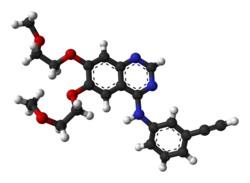 | |
 | |
| Clinical data | |
|---|---|
| Trade names | Tarceva |
| Other names | Erlotinib hydrochloride |
| AHFS/Drugs.com | Monograph |
| MedlinePlus | a605008 |
| License data | |
| Pregnancy category | |
| Routes of administration | By mouth |
| ATC code | |
| Legal status | |
| Legal status | |
| Pharmacokinetic data | |
| Bioavailability | 59% |
| Protein binding | 95% |
| Metabolism | Liver (mainly CYP3A4, less CYP1A2) |
| Elimination half-life | 36.2 hrs (median) |
| Excretion | >98% as metabolites, of which >90% via feces, 9% via urine |
| Identifiers | |
| |
| CAS Number | |
| PubChem CID | |
| IUPHAR/BPS | |
| DrugBank | |
| ChemSpider | |
| UNII | |
| KEGG | |
| ChEBI | |
| ChEMBL | |
| CompTox Dashboard (EPA) | |
| ECHA InfoCard | 100.216.020 |
| Chemical and physical data | |
| Formula | C22H23N3O4 |
| Molar mass | 393.443 g·mol−1 |
| 3D model (JSmol) | |
| |
| |
| (verify) | |
Erlotinib, sold under the brand name Tarceva among others, is a medication used to treat non-small cell lung cancer (NSCLC) and pancreatic cancer.[4] Specifically it is used for NSCLC with mutations in the epidermal growth factor receptor (EGFR) — either an exon 19 deletion (del19) or exon 21 (L858R) substitution mutation — which has spread to other parts of the body.[4] It is taken by mouth.[4]
Common side effects include rash, diarrhea, muscle pain, joint pain, and cough.[4][3] Serious side effects may include lung problems, kidney problems, liver failure, gastrointestinal perforation, stroke, and corneal ulceration.[4] Use in pregnancy may harm the baby.[4] It is a receptor tyrosine kinase inhibitor, which acts on the epidermal growth factor receptor (EGFR).[4]
Erlotinib was approved for medical use in the United States in 2004.[5][4][3] It is on the World Health Organization's List of Essential Medicines.[6]
- ^ "Erlotinib (Tarceva) Use During Pregnancy". Drugs.com. 1 November 2019. Archived from the original on 12 November 2019. Retrieved 23 December 2019.
- ^ a b "Tarceva (Erlotinib hydrochloride)". Roche Products Pty Limited. Australian Product Information. 31 August 2022.
- ^ a b c "Tarceva- erlotinib hydrochloride tablet". DailyMed. 12 December 2018. Archived from the original on 6 August 2020. Retrieved 23 December 2019.
- ^ a b c d e f g h "Erlotinib Monograph for Professionals". Drugs.com. Archived from the original on 24 December 2019. Retrieved 12 November 2019.
- ^ "Drug Approval Package: Tarceva (Erlotinib) NDA #021743". U.S. Food and Drug Administration (FDA). 28 March 2005. Archived from the original on 23 December 2019. Retrieved 23 December 2019.
- ^ Organization WH (2019). World Health Organization model list of essential medicines: 21st list 2019. World Health Organization. hdl:10665/325771.